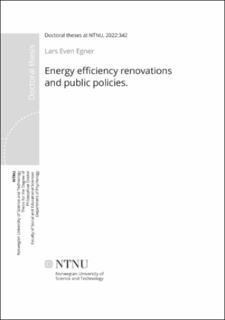Energy efficiency renovations and public policies.
Doctoral thesis
Permanent lenke
https://hdl.handle.net/11250/3034103Utgivelsesdato
2022Metadata
Vis full innførselSamlinger
- Institutt for psykologi [3141]
Sammendrag
Private household space heating represents 17% of all European final energy consumption. Therefore, it has a large environmental footprint and is a central piece of the puzzle for creating a sustainable world. Energy retrofitting—specifically building envelop measures—is the best way of reducing this energy need. However, behavioural research on energy retrofit policies has been lacking, limiting both effective policymaking and psychological knowledge on the topic.
In this PhD project, I explore what can be done to improve the energy efficiency of private households from a psychological behavioural standpoint. I employ three large-scale Norwegian surveys (n = 2605, 3797, 303) and one agent-based model generated in the project. I summarize psychological decision-making research I theorise should influence energy retrofitting behaviour, but usually investigated under different branches such as heuristics and biases, theory of planned behaviour, and spillover. Based on this, I predict that energy retrofitting is a self-reinforcing process. I replicate existing research on subsidy free-riding and provide the first data regarding the distribution of energy retrofitting subsidies between income classes in Norway. Finally, I generate an agent-based model based on existing psychological decision-making research, and implement and test different policies. Findings from the two first studies on free-riding and consecutive retrofitting are used to validate the model.
My results show that households that have recently energy retrofitted are likely to undergo subsequent energy retrofits. The distribution of subsidies for energy retrofits is skewed towards high-income households. In the agent-based model, the current Norwegian subsidy model reduces household energy use, but lowering the threshold for receiving subsidies will reduce energy use even more. Motivating households to retrofit more also reduces energy use. Marketing a specific energy standard, however, does not reduce household energy use.
Self-efficacy and attitude have a stronger association with energy retrofitting behaviour than age, income, loans, investment capacity, and house size and age. This suggests that psychological variables are more strongly associated with energy retrofitting behaviour than demographic ones. Although more research is needed for causal claims, this could indicate that energy retrofitting behaviour is primarily based on psychological constructs. Further implementing psychological theory and research in policymaking is essential for reducing private households’ energy consumption.
Består av
Paper 1: Egner, Lars Even; Kløckner, Christian. Temporal spillover of private housing energy retrofitting: Distribution of home energy retrofits and implications for subsidy policies. Energy Policy 2021 ;Volum 157. https://doi.org/10.1016/j.enpol.2021.112451Paper 2: Egner, Lars Even; Kløckner, Christian; Pellegrini-Masini, Giuseppe. Low free-riding at the cost of subsidizing the rich. Replicating Swiss energy retrofit subsidy findings in Norway. Energy and Buildings 2021 ;Volum 253. https://doi.org/10.1016/j.enbuild.2021.111542 This is an open access article under the CC BY license (http://creativecommons.org/licenses/by/4.0/).
Paper 3: Egner, Lars Even; Kløckner, Christian. Effect of Policy Implementation on Energy Retrofit Behavior and Energy Consumption in a Simulated Neighborhood. JASSS : Journal of Artificial Societies and Social Simulation 2022 ;Volum 25.(4) https://doi.org/10.18564/jasss.4936 This is an open access article under the CC BY license (http://creativecommons.org/licenses/by/4.0/).
